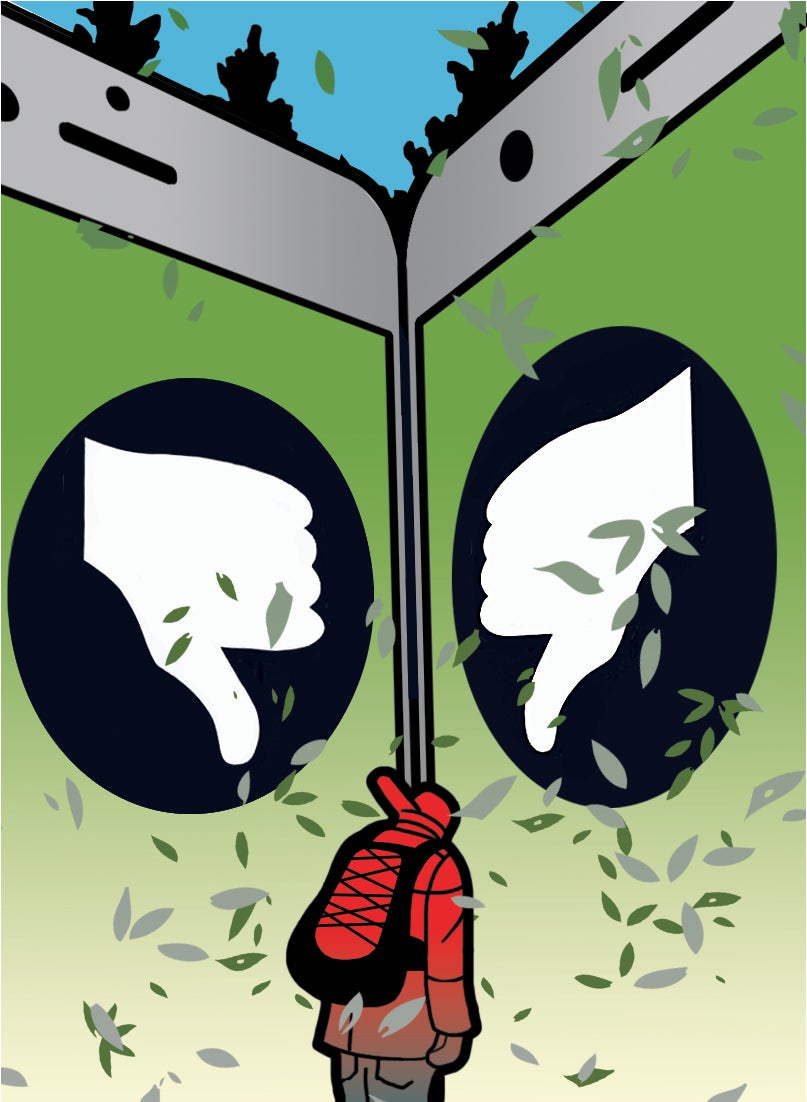Outdoor Shaming Needs to Stop

'Jason Schneider'
As I crested the hill to my favorite car camping spot in Utah, I found myself slamming the brakes. There it was, the dramatic view of the desert horizon exquisitely adorned with sandstone towers-—and a massive orange SUV. It wasn’t so much where the truck was that bothered me as how it got there: by driving off the trail, across the cryptobiotic crust, over the bumpy slickrock, and creating a brand-new campsite mere yards away from an established one. Clearly, the desert view of this person’s dreams was more important than the desert itself.
I wrestled with what to do. Should I go over there and explain the importance of staying on designated trails, roads, and impacted campsites? Should I snap a photo and share it on Instagram in hopes that this stranger’s missteps will prevent someone else from doing the same?
Lately, more and more people are going for option two, but lacing their “educational” posts with something more sinister: shame.
Thanks to social media, our individual voices can be heard like never before, which encourages people to share the things that matter most to them. And while we can all agree that stoke for and protection of favorite places is important and fun, there’s a good way to share those things—and then there’s shaming. Facebook and Instagram profiles devoted to publicly shaming people violating LNT, specifically on public lands, have gone viral. But let’s not let the low-impact message overshadow the fact that this is bullying, and we ought to call it so.
As a direct response to this sad new phenomenon, Leave No Trace added an “anti-shaming” clause to its code of ethics last summer, stating, “Shaming is not the answer.” Ailsa Walsh, Leave No Trace’s social media coordinator, penned the addition. “Over time, and particularly as social media has become part of everyone’s life, Leave No Trace is sometimes turned into a weapon, wielded to shame rather than educate,” she wrote. “Comments ranging from calling out someone’s lack of knowledge or experience, to violent threats and personal attacks, are sometimes done in the name of Leave No Trace.”
Online shaming might get you some likes, raise your standing in the community, and give you and your followers an intoxicating sense of righteous indignation—that’s why people do it. But it doesn’t actually work to counter what was wrong in the first place. Usually it does just the opposite, highlighting and reinforcing the negative behavior (psychology 101) rather than educating people on how to do it right.
“There is a widely held assumption that because shame is so painful, at least it motivates people to avoid ‘doing wrong,’” LNT said when introducing the new pillar. “As it turns out, virtually no direct evidence supports this presumed adaptive function of shame. To the contrary, research suggests that shame may even make things worse.”
Rather than positively influencing people, shaming is actually associated with greater levels of anxiety, depression, and social stress. Ironically, these are some of the ailments we seek relief from in the outdoors. All that is to say that shaming either encourages people to otherize themselves by acting worse, or it excludes them from an experience they could really use. Which of those is a positive outcome?
Bottom line: We need to stop. I refuse to like or otherwise pile on any LNT shaming on social media, and I unfollow accounts that endorse this sort of content. I’ve experienced online shaming firsthand for articles I’ve written and advocacy I’ve done, but instead of trying to hit back, I’m taking the high road. I hope to inspire people to create positive LNT messages on social media, help prevent these types of comments from going viral, and encourage more productive dialog and education online regarding how we use the outdoors.
I never did confront the owner of that orange SUV. LNT describes a friendly way to build rapport and educate people about best practices, called Authority of the Resource, but I opted to improve my own behavior instead as a model for others—and avoid a contentious situation in the middle of nowhere. We should always let our actions speak louder than our words, whether we’re online or off-the-grid.
CORRECTION: The story was updated to reflect the proper spelling of Ailsha Walsh’s name.